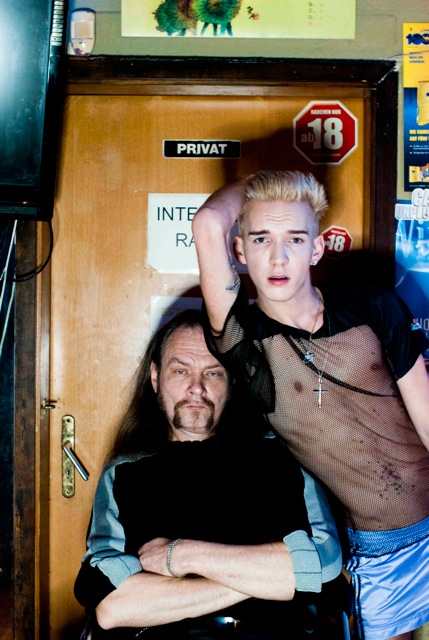240 Hours Later: The MEAT Debriefing
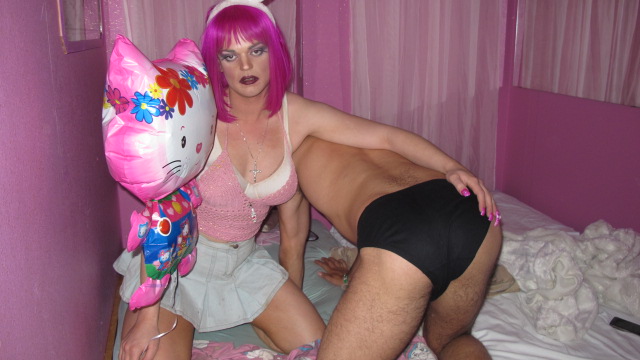
The most talked-about installation of the year in Berlin has been MEAT, directed by Thomas Bo Nilsson.
A 240-hour project, running 24/7 over ten days, MEAT was an immersive space: you enter through the door of the Schaubühne‘s studio and into a claustrophobic hyper-reality, 600 square meters of adjacent rooms. Through the door of a shabby bar, you emerge into the meticulously recreated flat of an accused killer. Next door is a pole-dancing night club, then through another door there’s a nail salon, a hotel where you rent a room by the hour, a Späti (24-hour shop), and a Chinese restaurant run by Japanese androids.
The labyrinth is populated by actors playing type-cast characters: dominatrix, rent-boy, Madame, cleaning lady, shop owner, cosmetician, masked man, greaser. All look rather sun-deprived and drained. Each has a Facebook profile and tries to friend you. It’s hard to get under the skin of these people. Even the lap dances they perform upstairs don’t go very far (after all, it’s an installation where you are on live video the whole time). But like Facebook, the superficial, the impressionistic, was strangely compulsive and addictive. I knew people who ended up going to MEAT almost every night, losing sleep, missing the personalities inside when back in ‘Berlin’, and ultimately despairing once the installation sold out, even in the wee hours, with long lines of hopeful wait-listers forming at 5am for a peek.
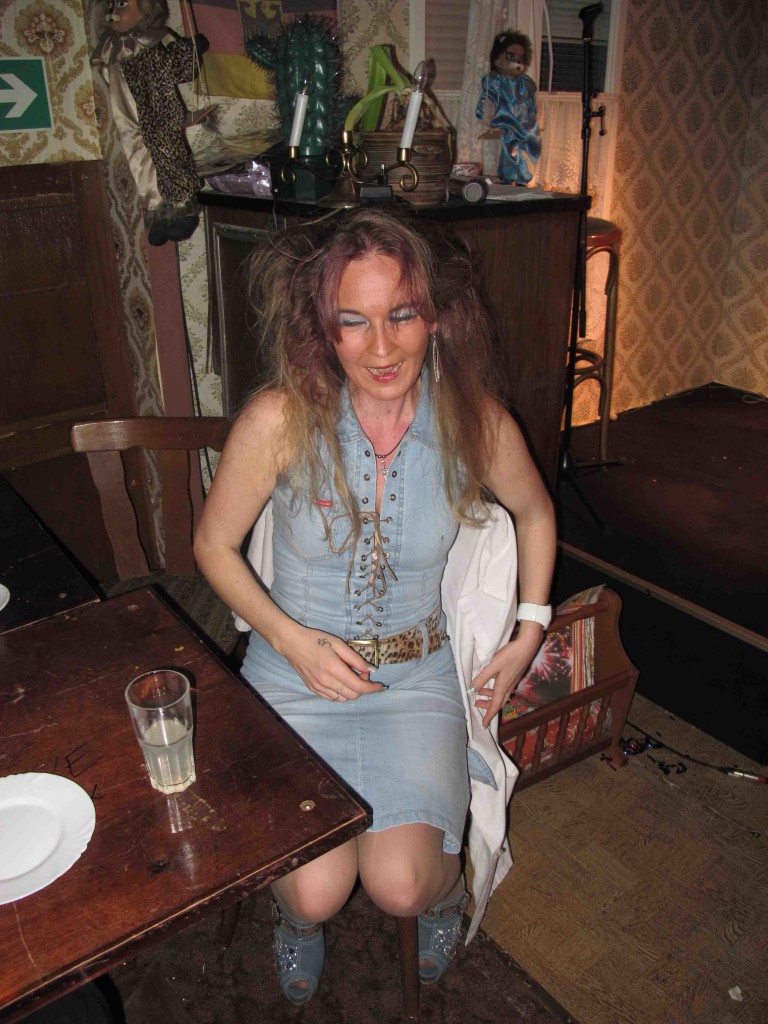
I happened to be sitting in the Schaubühne’s café after a performance last Sunday night, when a crowd of MEAT actors came pouring in. I had only ever met them in-character inside. The project had just ended: their universe had imploded. Gaby, who played a jolly but simple-minded cleaning lady, approached my table. I remembered her dragging her vacuum cleaner through the virtual strip club, and how she had showed me her book of animal photos on the sofa of a bric-a-brac apartment (where, her roommate Robin lay curled up in a corner, his nose broken by neo-Nazi thugs). She stretched out her hand, and said, ‘I just want to tell you my real name. I can’t tell you how great it is just to say it out loud’.
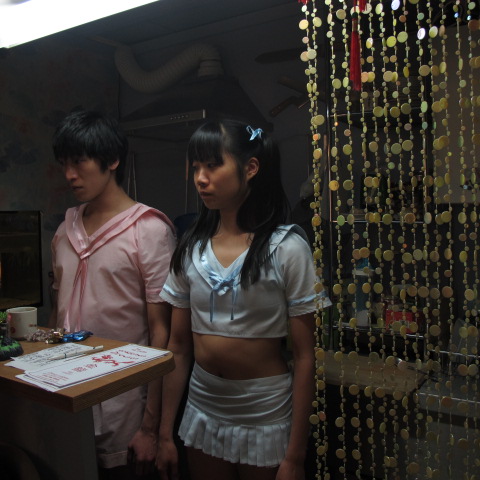
Meanwhile, the other MEAT characters crowd around the bar, order beers, and start dancing wildly. They need massive release. I approach them, and am surprised that they remember me, our conversations inside, and how they too feel the strong need to introduce themselves out-of-character.
They unload how very strange it is to relate to the rediscovered ‘reality’ of Berlin, and how utterly traumatic they found the destruction of MEAT’s world. Some of the actors commuted to the installation, but many slept, ate and worked the whole 240 hours inside. What struck me, too, was the way the actors were re-introducing themselves to each other, almost like strangers. After all those hours in-character, they had trouble remembering the ‘real’ names of those they had met pre-show in rehearsals when out-of-character. How do you feel when you have been relating intimately to someone for 240 hours and need to be reminded of their ‘real’ name?
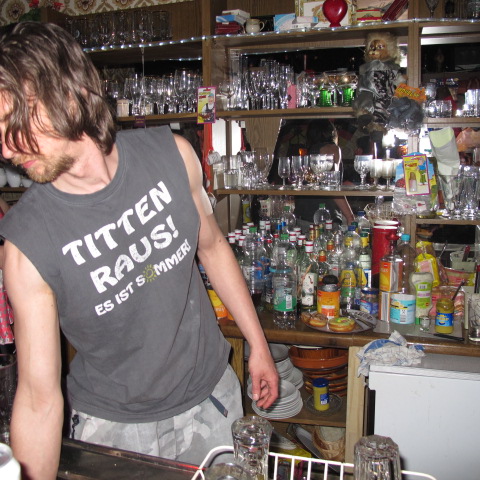
Soon, we are all piling into taxis, and descend on Kumpelnest 3000, one of Berlin’s trashiest, most David Lynchian, spaces, inhabited by a motley mix of escorts, married men on the down-low, arty types, and burnt-out drag queens. It is the kind of space that the installation was trying to reproduce. And then, suddenly, in walk twenty actors, fresh from MEAT, who are the hyper-real versions of the denizens of the bar.
As a pole-dancer moves her bare hips and kisses the other girls, and our drag queen flashes out across the dance floor, the tired bar crowd seems activated, join in, their dreary lives made suddenly cinematographic. We all group hug outside, going our separate ways after what is an intense night for me, and incomparably intense for the others who are experiencing a remarkable and potentially traumatic denouement from their time inside the studio. Then, to my surprise, the local, ‘real’ versions of the actors come outside to join in with the sudden embrace: Berlin’s actual underbelly, I suspect normally inured to such emotional outbursts, reaching out to that of the actors. An old man, in a yellowed fifties suit with a cigarette burning to his fingers, croaks at me: ‘Who are you?’ And I shrug, almost ashamed, ‘Actors’.
The Needle was the first to preview the event (read here), as part of the FIND-festival blog. Now we’d like to share our ‘debriefing’ interviews with the director and some of the actors, on what it is like to strike the set and return to ‘Berlin’ after such an intense time away.
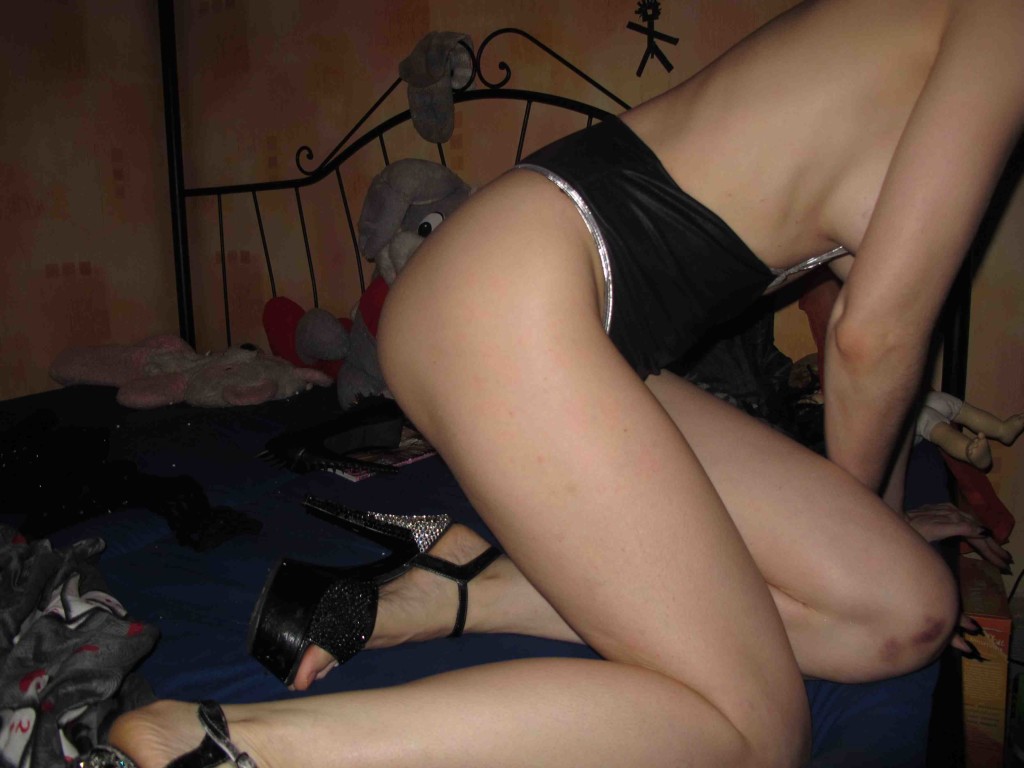
Thomas Bo Nilsson (Director of MEAT):
Joseph: How did you feel when the 240 hours of the MEAT installation finally came to an end on Sunday?
Thomas: Here, I want to refer to a text written by one of the actors, Ming Poon. It describes very well how it feels to end the show:
In those final minutes of ‘MEAT’, as it slowly came to its end, breathing its last breath, it seemed like I have been touched by a sense of grace. A grace that was not divine but purely human. Brokenly human. In those last minutes of the performance, when there were no longer any spectators in the room, each of us was left alone to bid our own farewells to the performance and to our characters. We understood that what we gave life to 10 days ago must now come to an end. As I looked on Joel’s lifeless body before me, I was reminded that my own character would also become a piece of meat without life. In fact, I must now confront and come to terms with my own character’s death. In a different room somewhere, someone is singing Donna Summer’s ‘Last Dance’. It sounded so faraway, like it was from another world. And that world could not touch me. At least not for now. While that world was singing and dancing, I was frozen within this suspended moment as I contemplated the end of things. Levin’s hand was gently stroking Joel’s body, as if to say: don’t leave so soon, stay just a while longer. I too was reluctant to let my ‘Joel’ go. I wanted to live a little longer, to continue my story a little longer. If the performance were to go on, I might have found happiness, I might leave in search of a better life, I might make new friends or learn to love truly and fiercely. But obviously all this would not happen. It all had to end tonight. 60 invented lives came to an end that night. We shared a collective sense of destiny and finality. It was a tremendous feeling. There was total silence. Some cried, some stared, some stood tall, some held hands, some collapsed, some smiled. And all the while, the dancers were gyrating their hips furiously, trying to squeeze out every remaining drops of sensuality contained within their bodies. Without any outside spectators, we became the only witness to each other’s silent desires and hopes. We were the last 60 spectators. There was ultimately something touchingly beautiful about seeing each of us confront our character’s death. Perhaps because death is always a very intimate and personal affair, or perhaps because we were stripped of our vanities and superficial trappings in the face of death. In that moment, I realised that ultimately we were all just a piece of meat. Quietly, I slipped out of the room so as not to disturb the others. I emerged feeling a little bit more human.
Joseph: How strenuous / difficult was the experience?
Thomas: It was sometimes painful, as I expected before. The artistic goal of the installation was always on a different scale than the practical circumstances, time frame and economy of the project. It took a lot of discipline, hard work and dedication to achieve what we did. Thanks to the crew, both the actors and the production team, I loved each and every one of the ten days we spent in the studio. Building up and establishing this was heavy––physically and mentally. Misquotations in the press and the fact that we are presenting and being judged in the world of theatre––when I actually consider the work installation art––took strength to deal with. I had to quickly decide only to focus on the immediate reactions of the audience rather than on gossip.
Joseph: Is it strange to interact with the actors when they are no longer in character?
Thomas: Before entering the universe and getting in to character, we had spent several months out of character building the set and rehearsing and deepening our characters. I primarily know everyone as the actors behind the roles, so no, that is not strange. I can, though, get sentimental, and miss some features of a character or songs they were singing or they way they speak or walk.
Joseph: Are the overlapping realities of MEAT and life post-MEAT confusing?
Thomas: Post life-MEAT is just born, and how it will feel in a week, I don’t know. Right now I am happy, proud, but also heartbroken as our team is being split, and the installation is, as one of the actors described, “a crumbling Atlantis”.
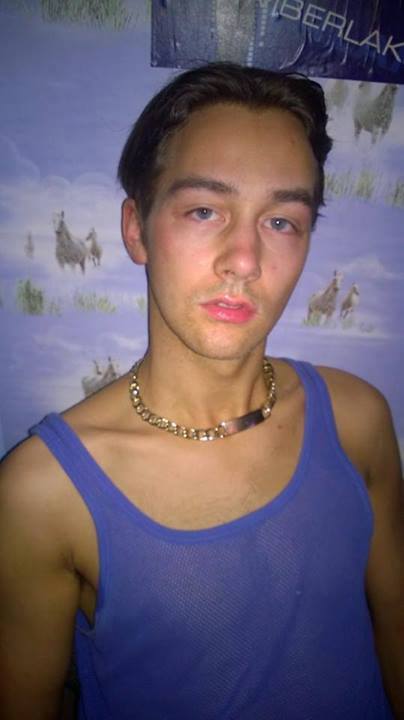
Joseph: Has MEAT changed the way you interact with the ‘reality’ of Berlin?
Thomas: Working with this format change the way I interact with people in general. Though I spoke with thousands of people in the piece, I don’t take part in Berlin night life or socialise very much privately. I will enjoy being alone now for a while.
Joseph: What is it like cleaning up the studio space?
Thomas: It completely sucks. Building it up, though being an extreme work load, was exciting and there was a goal. Tearing it down is painful and has the the feeling of walking around a grave. It is nice to find letters, secret scribbles on the walls and things brought in by audience, but that is that. The only way to cope with it is to think about the future and how all the items we pack away can take on a new role in a future piece.
Joseph: Did it feel like you were destroying a world that you had created? Is that world lost now? What kind of world was it, in retrospect?
Thomas: The moment the sound track was shut down, the installation died. It was no longer an imbiss, a kneipe a hotel or someone’s home. It was just wood, material and a lot of trash. Now the world only exist through the pictures, movie clips and and stories the actors are telling. We are collecting all the conversations and material from the online forums and platforms and they will be presented in a book in the coming year. It is too too early to be retrospective.
Joseph: Did you achieve what you wanted to with the installation? What are you most proud of? What would you have done differently/ have liked to have been different?
Thomas: I am proud of each and every member of our team and how strong we stood together during difficulties. The support within the actors’ crew, as well as the outside support from the set and production team, during the show makes me proud. Of course I could never have accomplished this alone. There are ideas that fell out of orbit and scenarios that I might have wanted to have taken a different outcome. It doesn’t mean I consider it wrong: it has to have it’s own life and adjust to the current mode of the show or it will be forced. Maybe these ideas will have a better place in a future project.
Joseph: What are you next plans?
Thomas: Secret!
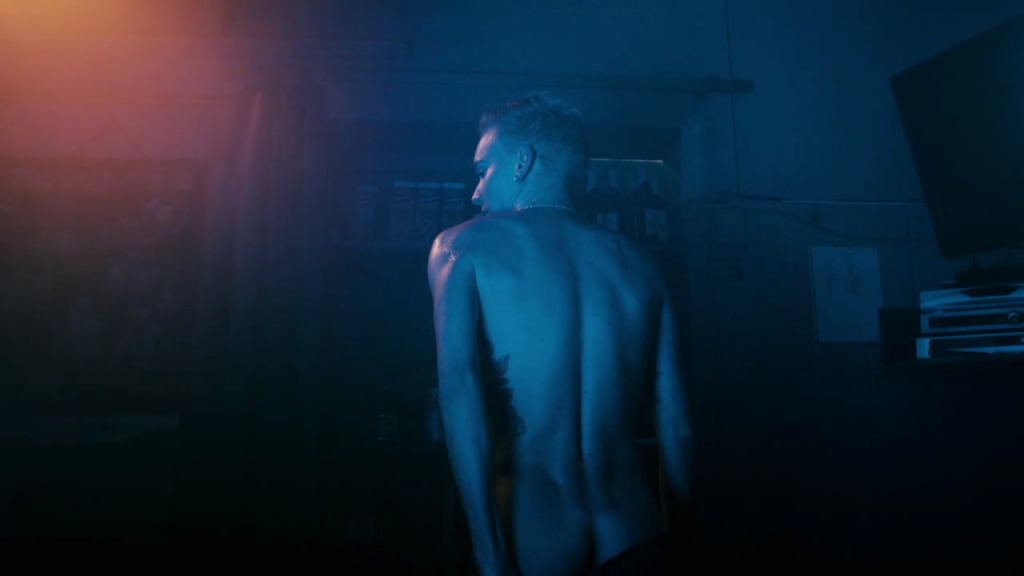
Stuart Meyers (Angel: lounge performer at the Kneipe):
Joseph: In what ways has your experience of performing in MEAT changed your perspective on Berlin and yourself?
Stuart: After MEAT, I can’t help but pass a Späti, a clothing store, or a Kneipe and study the faces and objects inside more carefully. Everyone becomes an interesting character and everything becomes a beautiful image. But I’m studying myself in the same way and it’s frightening. I’m having trouble recognizing Stuart. He––meaning me, I guess––is not the same. At least, I realize that I’ve aged from this work, maybe because I came face to face with evil for the first time. This realization hit me with the conclusion of MEAT, when Joel laid there dying in the shopping mall surrounded by a chorus of pole dancers. Levin (his killer) and the rest of us, guilty bystanders, looked down on him. In this moment, I finally felt the pain and horror of the world I had inhabited for 240 hours. It hit me so hard that I curled up into a ball and wept. I wept for Lin Jun, I even wept for Luka, but I mostly cried for Angel, and the thick skin I had during this time. Because, although I could take off his shoes and return to my unconditional loving community, some other Angel could not do the same. Little did I know that this process would bring with it a feeling of gratitude.
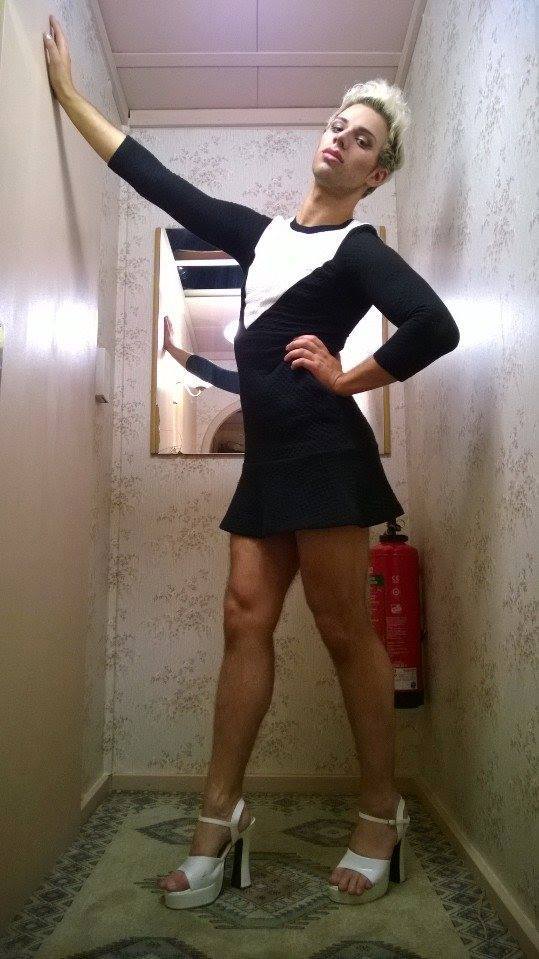
Johannes Frick (character of Robin):
Joseph: Who is Robin?
Johannes: Robin is a 22-year old kid who was never able to finish school, got into a neo-nazi pressure group through his former boyfriend, where he was forced to hide his homosexuality. His dream is to become a rich stockbroker one day.
Joseph: What is it like to come back to ‘reality’ after living in a 240-hour installation? What is it like pulling down the sets of a whole world you’ve lived in, walking down the street and seeing the characters that inhabit ‘this’ world? Or meeting fellow actors again in this world, when you had grown to know them much better by their stage-names in MEAT?
Johannes: Reentering the MEAT-installation on April 14th, the magic is gone. I see, through tears, my old flat consisting of nothing but a piece of carpet, on the floor of the huge black Schaubuehne Studio. There’s Lukas’ flat, where I was making out with Joel, Henning and Peter. I fixed the carpet of this room to the ground. There’s the Kneipe, where I got a Toast Hawaii. Now, the wall in the back, where the stage used to be, has disappeared. The corridor where the blow job scene took place is just a black line on the floor and the Lucky Star [the Night Club] is now packed with cartons filled with props. There, Robin danced the pole from time to time, but could never get a client in the room upstairs… but, hey, John made a movie about him there. And then there are all the other rooms, where I got to know so many marvelous people, where I had so many beautiful experiences as someone much more stupid and naïve than myself: a guy called Robin, that i will probably miss––a little. We packed up the last pieces of a dream that for ten days was our reality, and at 1am I am leaving the Studio. I weirdly feel I have put this dream into boxes with all the bitter-sweetness of its disappearance. But I know that in those boxes our memories live on, in a container belonging to Thomas Bo, who gave us this amazing present. I hope so much that someday I will meet some of them again, in another context, as well as those crazy and beautiful and beloved people that were all part of this.
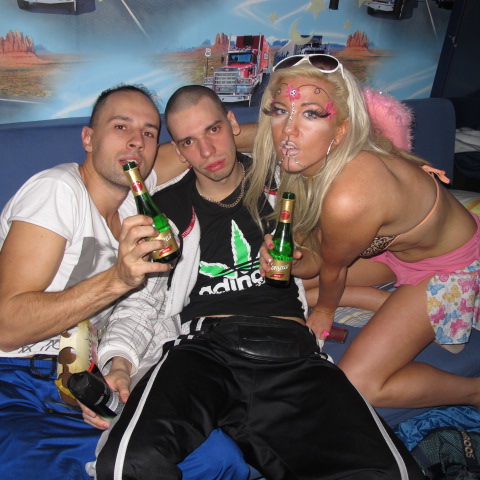
Tim-Fabian Hoffmann (character of Joel––a night-club dancer in the ‘Lucky Star’ whose death was the culmination of the MEAT installation):
Joseph: What is the afterlife of MEAT for you?
Tim-Fabian: The final moments of MEAT were really intense. They were accompanied by a sound installation consisting of multiple layers, including noises from the audience and actors, sounds from the lights, songs, and sounds recorded for the installation. When the performance stopped, all those sounds were muted all of a sudden. For the first moment in all those ten days on set, there was for a short time a moment of total silence: the moment of saying goodbye to the installation and to our characters. It was very emotional and each one of us had a different approach to it. At this culminating point, I was hanging at “zu den drei stufen”, as they say in German, with other co-performers, dried blood still clinging to my body, wrapped in a towel and drinking a goodbye shot with the others. When I introduced myself to a co-actor, whom I had only met in-character, I realised that I automatically shook his hand the way Joel used to, making us both feel awkward for a second and leading to a funny moment that we shared.
After a night out with part of the ensemble, I rested for hours in my bed before heading to rehearsals for a feature film I will act in soon. There wasn’t much time for me to realise how quickly an entire world of characters had closed for me––the wonderful set, its smells and its noises. When I first went out into the subway, heading to the next rehearsal, I felt a bit as if I was floating between two worlds. One part of me was very grateful, happy and free, and the other part was already excited and prepared for the next experience that was starting immediately. Due to this immediate jump into a new production, I was really excited about meeting again so soon everybody who had taken part in creating MEAT’s world––especially to see how it would be to see the people behind the characters again after these 10 days spent in a different world. Everybody got quite involved and attached to their characters and their backstories, so this will be a very precious moment to discover the personalities behind these characters again.
Today, a friend sent me a picture of the deconstructed set and it felt really awkward seeing it, since one knows how much effort was put into it, only to dismantle it in a short time to make space for the next production. I know this quick change from other theatre productions, but there you usually don’t spend 10 days of your life imitating a whole everyday life-sequence.
It was somehow easy saying goodbye since my character died in the end. But, on the other hand, it is like looking back into a period of your own life that has naturally come to a close, like seeing pictures of your old school friends or pictures from very pleasant class trips in school. Only that this experience is only 2 days in the past. Now, things start slightly to become normal again, but I am still sometimes finding myself imitating Joel’s moves in my daily routine: e.g. when the first letter I type when going online is the letter of Joel’s and not my own personal email-address. I find myself smiling, despite myself, and it reminds me of the wonderful trip I took with MEAT, and all the loving people I encountered during this time.
———————–
by Joseph Pearson
